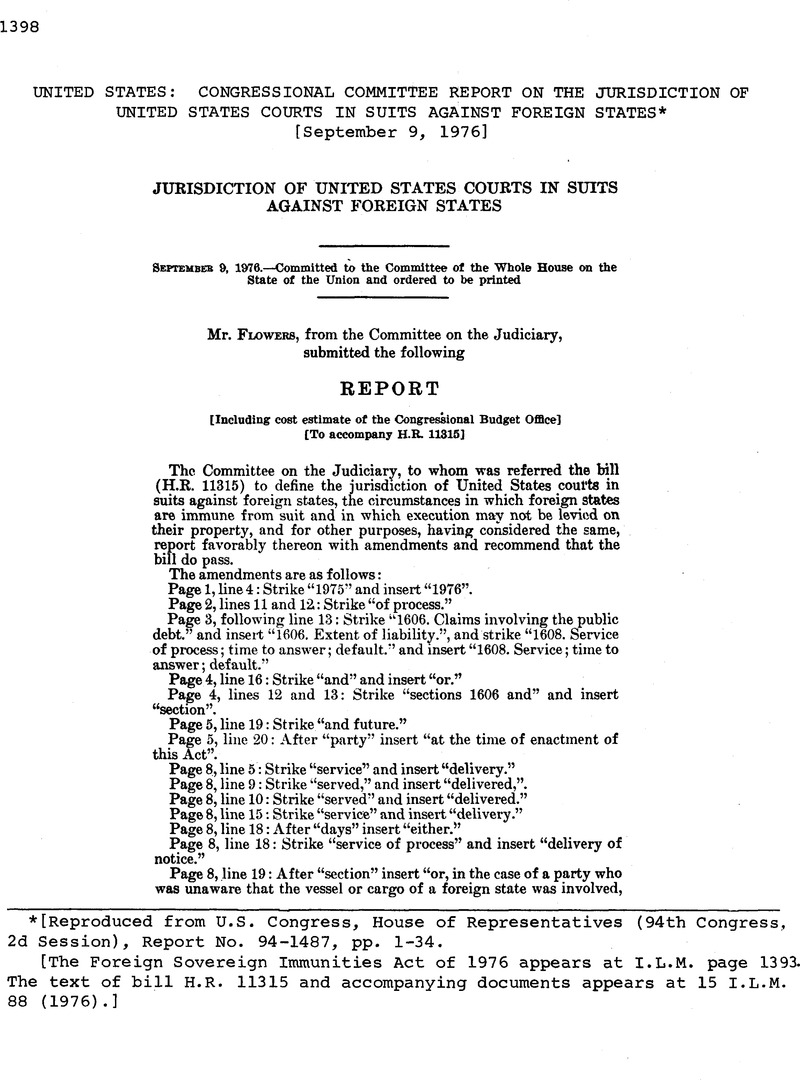Article contents
United States: Congressional Committee Report on the Jurisdiction of United States Courts in Suits Against Foreign States*
Published online by Cambridge University Press: 20 March 2017
Abstract

- Type
- Reports
- Information
- Copyright
- Copyright © American Society of International Law 1976
Footnotes
[Reproduced from U.S. Congress, House of Representatives (94th Congress, 2d Session), Report No. 94-1487, pp. 1-34.
[The Foreign Sovereign Immunities Act of 1976 appears at I.L.M. page 139: The text of bill H.R. 11315 and accompanying documents appears at 15 I.L.M. 88 (1976).]
References
1 The committee has been advised that in some cases, after the defense of sovereign immunity has been denied or removed as an issue, the art of state doctrine may be improperly asserted in an effort to block litigation. Under the act of state doctrine. United States Courts may refuse to adjudicate the validity of purely public acts of foreign sovereigns, as distinguished from commercial acts, committed and effective within their own territory. For example, in the Supreme Court's recent decision in Dunhlll v. Republic of Cuba, 44 U.S.L.W. 4665. No. 73-1288 (Stay 24, 1976, the respondent having brought suit (and thus clearly having waived the defense of sovereign immunity) attempted to assert that a refusal to pay a commercial obligation was not reviewable because it was an “act of state”.
The committee has found it unnecessary to address the act of state doctrine in this legislation since decisions such as that in the Dunhill case demonstrate that our courts already have considerable guidance enabling them to reject improper assertions of the act of state doctrine. For example, it appears that the doctrine would not apply to the cases covered by H.R. 11315. whose touchstone is a concept of “commercial activity” Involving significant Jurisdictional contacts with this country. The conclusions of the committee are in concurrence with the position of the government in its amicus brief to the Supreme Court in the Dunhill case where the Solicitor General stated: “[U]nder the modern restrictive theory of sovereign Immunity, a foreign state is not immune from suit on its commercial obligations. To elevate the foreign state's commercial acts to the protected status of 'acts of state' would frustrate this modern development by permitting sovereign immunity to reenter through the back door under the guise of the act of state doctrine.” (Amiens Brief of United States, p. 41.)
2 e.g. 5 U.S.C. 532 concerning public information.
3 Cf. Statement In the analysis of section 1606 noting that appropriate remedies would be available under Rule 37, F.R. Civ. P., for an unjustifiable failure to make discovery.
- 3
- Cited by


